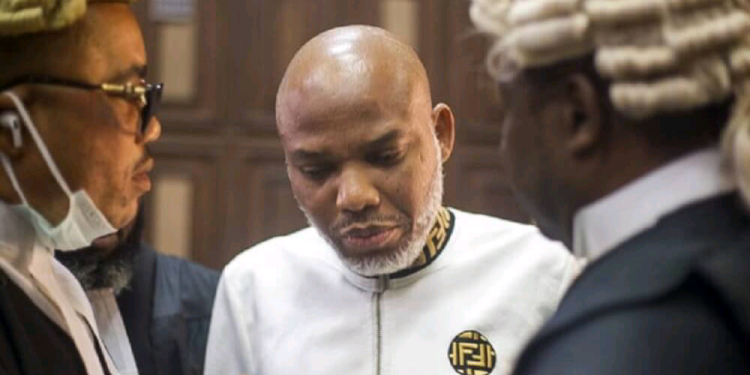The leader of the Indigenous People of Biafra (IPOB), Mazi Nnamdi Kanu, has appealed to world powers and international organizations, urging them to intervene in what he describes as his unlawful and unconstitutional detention by the Nigerian government.
In a petition dated August 22, 2025, and obtained by THE WHISTLER, Kanu directed his plea to multiple foreign missions and institutions, including the United States, United Kingdom, Canada, Germany, France, European Union, Netherlands, Sweden, Amnesty International, Red Cross, African Union (AU), ECOWAS Court, Kenya, South Africa, Norway, Denmark, Japan, Brazil, Israel, Finland, and Austria.
Among the leaders directly addressed in the petition is former U.S. President Donald Trump, whom Kanu has previously praised for his strong stance on religious freedom and minority rights in Africa.
Detention Since 2021: A Timeline of Events
Kanu, who holds dual Nigerian-British citizenship, has been in solitary confinement since June 2021, following his controversial arrest and extraordinary rendition from Kenya. According to his legal team, the manner of his transfer to Nigeria violated both international law and the Extradition Act of 2004.
The case took a dramatic turn on October 13, 2022, when the Nigerian Court of Appeal discharged and acquitted him, ruling that his abduction from Kenya was illegal and that any subsequent trial in Nigeria was invalid. The court stated clearly that his extraordinary rendition amounted to a jurisdictional nullity, meaning that all Federal High Court proceedings against him were void.
ALSO READ: Abia Deputy Speaker Clarifies Tragic Convoy Accident, Extends Condolences
However, just two weeks later, on October 28, 2022, the Court of Appeal controversially granted a stay of execution, which allowed the Nigerian government to continue holding him despite the earlier ruling in his favor.
Kanu’s situation worsened in December 2023, when the Nigerian Supreme Court overturned the Court of Appeal’s decision, ruling that he must continue to face trial. The apex court’s verdict sparked outrage among his supporters and renewed international debate over the credibility of Nigeria’s judicial system.
Supreme Court Ruling and Alleged Constitutional Violations
In his latest petition, Kanu strongly condemned the Supreme Court’s judgment of December 15, 2023 (Appeal No. SC/CR/136/2022), calling it a “perverse and unconstitutional ruling.” He argued that the court ignored the principle of stare decisis (the doctrine of following established legal precedents) and violated his fundamental human rights as protected under the 1999 Nigerian Constitution.
“The Nigerian Supreme Court’s perverse and unconstitutional ruling reversed my lawful discharge and acquittal despite clear violations of my fundamental rights,” Kanu wrote.
He further accused the judiciary of undermining the rule of law by disregarding international treaties and conventions to which Nigeria is a signatory, including the African Charter on Human and Peoples’ Rights.
Call for Urgent Global Intervention
In his appeal, Kanu implored world leaders, human rights organizations, and regional blocs to compel the Nigerian government to respect its own laws and international obligations.
“By this letter, I respectfully implore your urgent intervention to compel the Nigerian government to adhere to its own laws, respect stare decisis, and uphold the constitutional supremacy enshrined in the 1999 Constitution,” he said.
He emphasized that his continued detention is not just a personal injustice but also a dangerous precedent that threatens the sanctity of constitutional democracy in Nigeria.
International Reactions and Implications
The petition has reignited global interest in Kanu’s case, which has long been a subject of international human rights discourse. Organizations like Amnesty International and Human Rights Watch have previously criticized Nigeria’s handling of his arrest and detention.
The involvement of powerful states and institutions such as the United States, United Kingdom, European Union, and African Union could significantly influence how the Nigerian government responds moving forward. If these nations take a strong diplomatic stance, Nigeria may face increasing pressure to comply with court rulings and international human rights standards.
Moreover, Kanu’s appeal to Donald Trump could resonate with U.S. conservative groups who have historically spoken out on issues of religious persecution, freedom of expression, and minority rights in Africa.
The Biafra Question and Wider Political Context
At the heart of Kanu’s struggle is the Biafra independence movement, which seeks the secession of Nigeria’s South-East region. IPOB, under Kanu’s leadership, has maintained that the Igbo people continue to face systemic marginalization within Nigeria.
The Nigerian government, however, has branded IPOB a terrorist organization, accusing it of inciting violence and threatening national security. This designation has been widely criticized by Kanu’s supporters, who argue that IPOB is a non-violent self-determination group.
Kanu’s detention has become a flashpoint in Nigeria’s political landscape, fueling protests across the South-East and deepening calls for a referendum on Biafra’s independence. The case also highlights Nigeria’s complex balance between national sovereignty and international accountability.
Potential Outcomes and Future Developments
Analysts believe that Kanu’s petition may open new diplomatic channels, especially if powerful nations and institutions decide to exert pressure on Abuja.
Possible scenarios include:
- Diplomatic Pressure: International bodies could urge Nigeria to release Kanu or at least grant him fair trial conditions consistent with international law.
- Judicial Review: Domestic and regional courts, such as the ECOWAS Court of Justice, could re-examine the legality of his detention.
- Political Negotiation: The Nigerian government might consider dialogue with IPOB and other stakeholders to reduce rising tensions in the South-East.
- Continued Stalemate: If the government resists international pressure, Kanu’s detention could drag on, potentially fueling unrest and international criticism.
Conclusion
Mazi Nnamdi Kanu’s latest petition to Donald Trump, the African Union, and world leaders underscores the international dimension of his detention and the broader struggle for justice in Nigeria. His case continues to test the country’s judiciary, its commitment to constitutional supremacy, and its standing in the global human rights community.
As pressure mounts, the Nigerian government faces a defining choice: uphold the rule of law and court rulings, or risk deeper isolation and international scrutiny over its handling of a case that has become symbolic of both justice denied and the enduring struggle for self-determination in Africa.


